The Castle of Randon and Bertrand Du Guesclin |
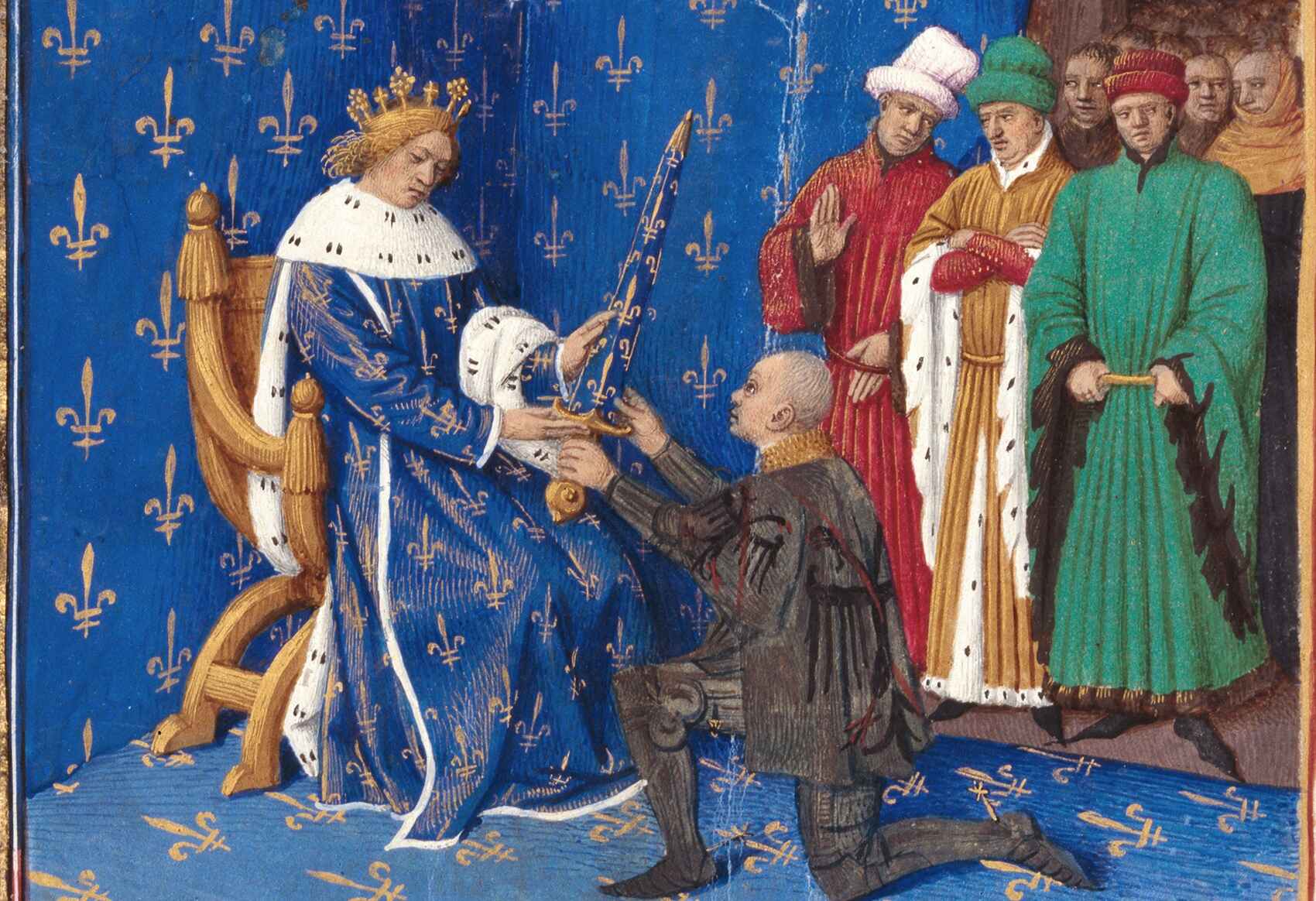
 Before the 12th century, Châteauneuf-de-Randon was ruled by the Counts of Barcelona; one of them, Raymond Berenger, entrusted it as a fief to the brothers Guarin and Odilon (1126), whose successors founded the abbey of Mercoire (1187-1223). Later, one of its lords had violent disputes with Guillaume de Peyre, bishop of Mende, who reproached him for oppressing the peasants, his vassals.
Before the 12th century, Châteauneuf-de-Randon was ruled by the Counts of Barcelona; one of them, Raymond Berenger, entrusted it as a fief to the brothers Guarin and Odilon (1126), whose successors founded the abbey of Mercoire (1187-1223). Later, one of its lords had violent disputes with Guillaume de Peyre, bishop of Mende, who reproached him for oppressing the peasants, his vassals.
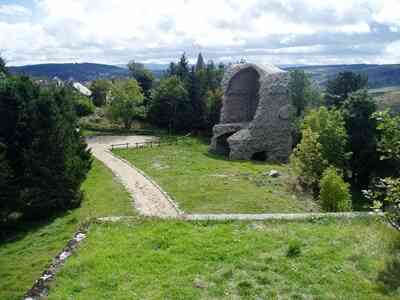 Guillaume invaded his domains and forced him to seek peace. Odilon Guarin submitted to King Louis VIII in 1226. From 1233 to 1243, the lords of Randon, in open war with the Polignacs, became their allies, thanks to the mediation of Bernard de Montaigne, bishop of Puy-en-Velay, and eventually merged completely into this house.
Guillaume invaded his domains and forced him to seek peace. Odilon Guarin submitted to King Louis VIII in 1226. From 1233 to 1243, the lords of Randon, in open war with the Polignacs, became their allies, thanks to the mediation of Bernard de Montaigne, bishop of Puy-en-Velay, and eventually merged completely into this house.
Châteauneuf-de-Randon, having become one of the strongholds of Gévaudan, fell, in 1361, under the control of the great companies, one of whose leaders, Séguin de Badifol, a Gascon knight, roamed the country at the head of 3000 pillagers. Twenty years later, in 1380, others seized it. These companies, half English, half Gascon, had settled in several strongholds in Auvergne and Languedoc due to the wars between France and England.
But the castle of Randon is especially famous for the siege that the English endured there against Bertrand Du Guesclin that same year. "Sir Bertrand," says Froissart, "swore that he would not leave there until he had the castle to his liking; but an illness took him, and he was bedridden; thus, the siege was not lifted; but his men became more bitter than before."
Sensing his impending end, Du Guesclin embraced the old captains around him and, before dying, urged them not to forget that in any country they waged war, the clergy, women, children, and the poor populace were not their enemies; he died the next day. However, the governor had promised to surrender in fifteen days if he was not relieved; Marshal of Sancerre advanced on the banks of the ditch of the besieged city and summoned the governor to surrender: he replied that he had given his word to Du Guesclin and would only surrender to him.
Then Sancerre admitted that the constable was no more. "Well," said the governor, "I will carry the keys of the city to his tomb." Sancerre returned to prepare for this extraordinary ceremony. Everything mournful was removed from the hero's tent: his coffin was placed on a table covered with flowers. Soon the governor of Châteauneuf-de-Randon was seen leaving the place at the head of his garrison; he crossed the army to the sound of trumpets and arrived in Du Guesclin's tent; the principal officers of the army were gathered there, standing and silent. The governor knelt before the body of the constable and laid the keys on his coffin.
To this account, embellished by historians, we will add two passages from the Chronicle of Du Guesclin, published by Francisque Michel.
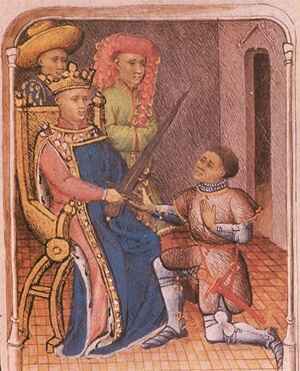 "Sir Bertrand did not stay long in Paris; but by the king's accord, Sir Bertrand assembled a very large army and entered the duchy of Guienne, conquering towns and castles until he arrived before Châteauneuf-de-Randon. There were English who guarded the castle, and it was greatly stocked with provisions and artillery. The castle was strong and well-fortified. And Sir Bertrand laid siege to it and launched assaults several times; but accomplished little there."
"Sir Bertrand did not stay long in Paris; but by the king's accord, Sir Bertrand assembled a very large army and entered the duchy of Guienne, conquering towns and castles until he arrived before Châteauneuf-de-Randon. There were English who guarded the castle, and it was greatly stocked with provisions and artillery. The castle was strong and well-fortified. And Sir Bertrand laid siege to it and launched assaults several times; but accomplished little there."
Sir Bertrand swore the siege and so pressed the English that they had no provisions from anywhere. Thus, the English requested a day of truce and sent their captain to Sir Bertrand who negotiated that on a certain day they would surrender the place, if they were not aided by the English king, and this was promised, and hostages were given to Sir Bertrand: thus the truce was granted to them until the day they were to surrender the castle.
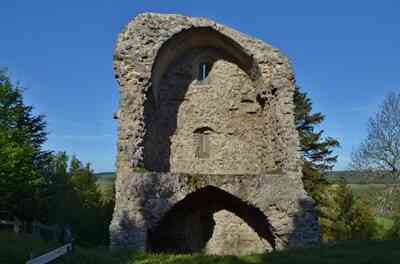 During the truce taken by the English to surrender Châteauneuf-de-Randon, Sir Bertrand who held the siege fell sick in bed. And when he saw death approaching so closely, he devoutly received the sacraments and called for Marshal of Sancerre, whom he held in high regard, Sir Olivier de Mauny and the chivalry of his siege, to whom he said: "Lords, I must soon leave your company for death, which is common to all. By your valor and not by me, fortune has kept me in great honor throughout France in my life, and you deserve the honor. My soul recommends to you."
During the truce taken by the English to surrender Châteauneuf-de-Randon, Sir Bertrand who held the siege fell sick in bed. And when he saw death approaching so closely, he devoutly received the sacraments and called for Marshal of Sancerre, whom he held in high regard, Sir Olivier de Mauny and the chivalry of his siege, to whom he said: "Lords, I must soon leave your company for death, which is common to all. By your valor and not by me, fortune has kept me in great honor throughout France in my life, and you deserve the honor. My soul recommends to you."
"Certainly, lords, I intended to finish the wars in France swiftly by your valor and restore all his kingdom to King Charles; but my company can no longer be held. And yet, I ask God, my Creator, to give you courage always toward the king; so that through you, Lord Marshal, and through your valor and all the chivalry, who have always loyally and valiantly stood by him, his wars may be finished."
"My lord Marshal and you other lords who are here, I wish to ask of you one thing, which would give great peace to my soul if it could be done. And I will say what it is: you know, lords, that the English have demanded of me a day for their castle to surrender: hence, in my heart, I greatly desire that, before my death, the English would surrender the castle."
At Sir Bertrand's words, all the chivalry had great pity that none could express. One looked at the other in tears, grieving with a sorrow unlike any ever seen and said: "Alas! We lose our good father and captain, our leader who nourished us so sweetly and securely guided us, and if we have well and honor, it is through him."
 "Oh honor and chivalry, you will lose so much when this one passes away!" And many others lamented among the army so much that those in the castle caught some of it; but why it was they knew not. Thus the day passed, and no aid came to the castle from the English king.
"Oh honor and chivalry, you will lose so much when this one passes away!" And many others lamented among the army so much that those in the castle caught some of it; but why it was they knew not. Thus the day passed, and no aid came to the castle from the English king.
And the next day, Marshal of Sancerre came before the castle and summoned the castle captain, who soon came to him; and very gently Marshal of Sancerre said to him: "Captain and friend, on behalf of my lord the constable, I come to request that the castle and the keys be surrendered, along with your hostages, according to your promises." Courteously, the captain replied: "Sir, it is true that we have agreements with Sir Bertrand, which we will keep when we see him, and not to another."
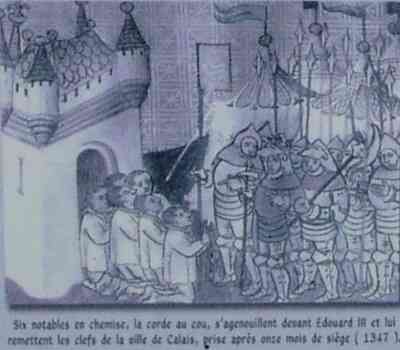 "Friends," said the marshal, "if he were to come, I wouldn't say it at all. Certainly, sir, I will act as your messenger and consult with the companions of the garrison about your words, then I will respond to you, if you please after dinner." To this, Marshal Loys de Sancerre agreed, who went to Sir Bertrand and related what he found with the English.
"Friends," said the marshal, "if he were to come, I wouldn't say it at all. Certainly, sir, I will act as your messenger and consult with the companions of the garrison about your words, then I will respond to you, if you please after dinner." To this, Marshal Loys de Sancerre agreed, who went to Sir Bertrand and related what he found with the English.
Then Sir Bertrand faced his end and recognized it well. Therefore, he sent for the royal sword, which was brought to him. And he took it in his hand and then said to all: "Lords, with whom I have had the honor of worldly valor, for which I am indeed worthy, I must pay the due of death, which none can escape."
"First, I ask that you have the kindness to commend my soul to God. And you, Loys de Sancerre, who are Marshal of France, you have indeed deserved much honor, please recommend my soul, my wife, and all my kin."
"To King Charles of France, my sovereign lord, I commend you, and this sword, under which France is governed, I return to him on my behalf; for in the hands of no more loyal can I put it under guard." And after these words, he made the sign of the cross upon himself.
And thus passed from this world the valiant Sir Bertrand Du Guesclin, who valued so much in his days, hence known for the reign of his loyalty as the Tenth of gallant men...
In another manuscript, that of Lancelot, the following account can be found, presenting a more plausible version of the praised conduct of the governor of Châteauneuf-de-Randon:
"At the passing of Sir Bertrand, there was a great cry in the army of the French; thus, the English refused to surrender the castle. Therefore, the Marshal Loys ordered the hostages to be brought to the ditches, to have their heads cut off; but apparently they lowered their bridge and the captain came to the marshal to offer the keys, which he refused and said to him:
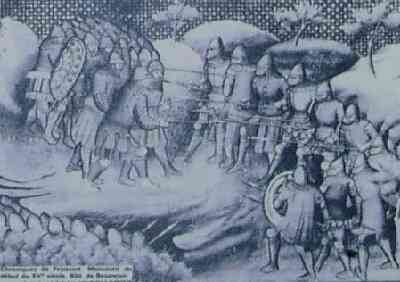 "Friends, you have agreements with Sir Bertrand and you will return them to him." — "By God! sir," said the captain, "you know very well that Sir Bertrand is dead, who was worth so much and how is it that we would surrender this castle to him? — "Certainly, Mr. Marshal, you seek our dishonor as you would have us surrender to a dead knight and to our castle. — "I cannot speak of this," said Marshal Loys; "but do it immediately: for if you hold more parley any longer, go to your castle to do service with your hostages: for shortly their lives will end."
"Friends, you have agreements with Sir Bertrand and you will return them to him." — "By God! sir," said the captain, "you know very well that Sir Bertrand is dead, who was worth so much and how is it that we would surrender this castle to him? — "Certainly, Mr. Marshal, you seek our dishonor as you would have us surrender to a dead knight and to our castle. — "I cannot speak of this," said Marshal Loys; "but do it immediately: for if you hold more parley any longer, go to your castle to do service with your hostages: for shortly their lives will end."
The English clearly saw that it could not be otherwise. Therefore, all exited the castle, their captain before them, and came to Marshal Loys, who led them to the tent where Sir Bertrand lay, and made them surrender their keys and place them on the body of Sir Bertrand, all weeping. Let it be known to all that neither French knights nor squires, nor English ones held their grief back. In this manner, Sir Bertrand Du Guesclin, who was worth so much, departed this world.
 And within Chastel-Neuf de Rendon, Marshal Loys stationed a garrison of men-at-arms and crossbowmen; then he left with great chivalry and made arrangements for the body of Sir Bertrand to be embalmed and transported for burial in Brittany at Gisgand...
And within Chastel-Neuf de Rendon, Marshal Loys stationed a garrison of men-at-arms and crossbowmen; then he left with great chivalry and made arrangements for the body of Sir Bertrand to be embalmed and transported for burial in Brittany at Gisgand...
But before arriving in Brittany, the funeral procession had to go back, by order of King Charles V, who ordered the remains of the constable to be laid to rest in the tombs of Saint-Denis. The church of the Jacobins of Puy kept his entrails; that of the Dominicans had his heart.
Châteauneuf-de-Randon belonged to the family of Polignac; it was returned to them; but at the beginning of the 15th century (1426), an adventurer named André Ribes, taking advantage of a succession dispute among the Polignacs, forcibly seized the castle and entrusted its guard to a detachment of the gang of brigands of which he had made himself chief, and with whose help he plundered the seneschalries of Beaucaire and Toulouse.
André Ribes claimed the title of bastard of Armagnac, although he had no right, undoubtedly encouraged by the protection of the Count of Armagnac, who favored his criminal enterprises.
Later, Claude-Armand de Polignac, irritated with his father François-Armand, who wanted to force him to embrace the ecclesiastical state to leave his possessions to young Louis, born of another bed, allied with the Calvinists for revenge, and led their troops against his family's domains; he seized Châteauneuf-de-Randon, and, as master of the place, made it a stronghold from whence he would ravage all the surrounding areas.
At the particular states of Gévaudan, held at Mende in 1605, the Count of Polignac, as Baron of Randon, contested precedence with the Count of Apcher. The latter having prevailed, Villefort, brother of the Count of Polignac, a man of violent temperament, could not bear this affront; aided by devoted men, he assassinated d'Apcher in the midst of mass, in the church of Mende. He paid for this crime and had his head cut off at Toulouse.
The castle of Randon was destroyed under the reign of Louis XIII, after the pacification of the region. At the foot of the mountain on which the small town is located runs the road from Mende to Puy-en-Velay. It is on this road, in the hamlet of L'Habitarelle, that a monument to Du Guesclin was erected in 1820, on the presumed site of the tent in which he died. by Victor Adolphe Malte-Brun, work of 1882
Former holiday hotel with a garden along the Allier, L'Etoile Guest House is located in La Bastide-Puylaurent between Lozere, Ardeche, and the Cevennes in the mountains of Southern France. At the crossroads of GR®7, GR®70 Stevenson Path, GR®72, GR®700 Regordane Way, GR®470 Allier River springs and gorges, GRP® Cevenol, Ardechoise Mountains, Margeride. Numerous loop trails for hiking and one-day biking excursions. Ideal for a relaxing and hiking getaway.
Copyright©etoile.fr